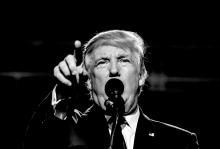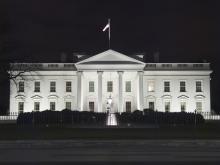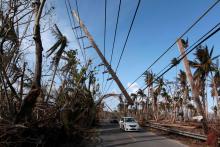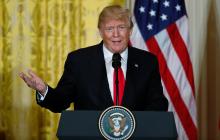Donald Trump

In a time like this, prayer is not perfunctory, an add on, or a brief closing to a meeting. Rather it is an opening to what indeed has now become “spiritual warfare” as the New Testament describes.

Trump's rallies, like his tweets, have been hard to watch, but they clearly reveal a political strategy of fear, based on continual and unapologetic lying, which deliberately evokes racial resentment and hatred. This president’s purpose is indeed to divide us, especially along racial lines. Again, we don’t yet know who is directly responsible for this latest string of violence, but it can no longer be said that there is no relationship between violent presidential rhetoric against opponents and the media, and the violent action against those very people. You can no longer say, “I don’t like his rhetoric and tweets, but I like his policies."

ON THE DAY Brett Kavanaugh was confirmed by the Senate to a lifetime seat on the Supreme Court, I tweeted this: “Today was a day of protest, rage, mourning, lament. Tomorrow we go on by going deeper, and learn that hope is not a feeling, but a decision—based on whatever we call faith. Stay strong and take care of each other.”
The nation is in trauma, with many women and people of color in particular being retraumatized almost every day. But Advent is upon us, and the message of that liturgical season never changes. Advent is a season of waiting for the coming of Christ. Christ will come again, and not just ultimately but time and time again, in all kinds of unexpected ways.
So, in Advent, we wait—expectantly—for Jesus Christ to come again in our personal and our public lives. That is our hope, based not on optimism but on faith.
The situation we face in Donald Trump’s autocratic impulses and actions is indeed a constitutional crisis, the severity of which will depend, in part, on whether our institutions and structures, in the wake of the midterm elections, will hold the executive accountable, or not.
This is also a moral crisis regarding whether our “better angels,” as Abraham Lincoln put it, or our worst demons, as Donald Trump seems to evoke every day, will finally triumph. As they say, the jury is still out on that. Trump has opened a Pandora’s box of white racial and male resentment, fear, and hatred, and those forces are not going back into the box, despite election results. The battle between our better angels and our worst demons will be the spiritual battle of our political life for the unforeseeable future.

An American evangelical Christian pastor at the center of a row between Ankara and Washington looked set to fly home on Friday after a Turkish court freed him, a move that may signal a step towards mending ties between the allies.

ON A BALMY SUMMER afternoon in July, I rang the bell at Jean Vanier’s sky-blue gate in Trosly-Breuil, France. Vanier, the founder of L’Arche, an international federation of communities of people with and without developmental disabilities, is central to a new documentary film, Summer in the Forest. I was there to interview him about the film and as research for a play I’m helping to write for the 50th anniversary of L’Arche Daybreak community, near Toronto.
As the gate opened, Vanier, wearing his signature navy blue jacket, greeted me with the warmest presence I have ever felt, saying, “All the way from Daybreak you have come to visit me!” I replied sheepishly, “Yes, to finally meet the man who changed my life.”
My salutation was not hyperbole—Vanier’s gift, a vision of communities where people live in a spirit of mutual learning, dignity, and care, has touched and changed the lives of thousands of people around the globe. Though I’d come for professional reasons, it also felt like a pilgrimage to seek Vanier’s wisdom in the place where it all began. He ushered me into his small office and living room to chat.
In 1964, while Vanier was living in Trosly-Breuil, he visited a psychiatric hospital near Paris. He saw men there subjected to violence, locked up all day, and feared by the public. He was moved with a compassion that he couldn’t totally understand at the time. But as Vanier told me, “We all have, as human beings, a design that teaches us to reach out to others, and not only to serve ourselves. If we listen to this inner design, this inner voice, it will lead us always to do what is right.” With little training and no formal plan, Vanier bought a dilapidated house and took three of the men out of the institution to live with him in the village.
The first night didn’t go so well, as they could not find how the electricity worked and one of the men became so frightened and violent, smashing windows, that he had to return to the institution the next day. Two of the men, Raphaël Simi and Philippe Seux, lived with Vanier for the rest of their lives. Vanier named their home “L’Arche,” French for “The Ark”—it became the first of what are now more than 150 L’Arche communities in 37 countries.

A SMALL WHITE CHAPEL sits just a couple hundred yards north of the Rio Grande river in Mission, Texas. While the chapel no longer hosts an active parish, its interior shows signs of frequent use. Prayer candles and silk flowers line the altar and the base of a shrine to Our Lady of Guadalupe. An entryway table holds dozens of prayers, written on folded loose-leaf paper. Children’s composition notebooks, filled with more handwritten prayers, are stacked in piles.
“Please watch over our brothers, sisters, and all the children being held hostage at the border,” one prayer says. And another: “Please bless our health & the children being separated from their parents @ the border.”
La Lomita Chapel is now part of a municipal park and serves as a rest stop for passersby—while Border Patrol trucks sit just outside the park entrance and a helicopter circles overhead. The chapel land was originally granted to Missionary Oblates of Mary Immaculate priests in the mid-1800s. Given its location—midway between mission centers in Brownsville and Roma, Texas—La Lomita served as a meeting place and “housed transient visitors to the mission,” according to a historic marker on the site.
I visited the chapel, quite by accident, during a reporting trip at the border at the height of the family separation crisis. The separation of parents and children moved the hearts—and wallets—of people across the nation. But that fervor waned after a U.S. District Court judge gave a July deadline for reunification and more than 1,500 children were reunited with their parents, largely thanks to the efforts of faith groups and advocates. For many, it seemed, the story was over. The reality is that the crisis continues.
As of this writing, 497 children remain separated from their parents, 22 of whom are under the age of 5. More than 300 parents have been deported, and many who signed a waiver to be reunited say they were coerced. Children, including some babies and toddlers, haven’t seen their parents in months. It’s likely that some of those children will never see their parents again.

The revelations at the end of the summer from journalist Bob Woodward and from the anonymous administration official writing in The New York Times provided more evidence, as if more were needed, of the unhinged, immoral, chaotic, and deeply corrupt nature of the president and his administration. They also underscored the absolute necessity of creating and bolstering whatever checks and balances are possible to this administration’s power—not merely because of political exigency, which is dire enough to fairly name it as a constitutional crisis, but because the integrity of our faith is at stake as well.
While I’m convinced that the very soul of our nation is under threat by this administration and its actions, it’s not just policy or even character issues per se that have brought us to this point—as important as they are. Those issues include racial bigotry that overtly denies the image of God in all people; the denial and destruction of truth itself; a reversal of Jesus’ leadership values of service over domination; our unity in Christ as opposed to oppression based on race, gender, and class; whether we put “America first” or affirm the global character of our faith and relationships; and the real danger of growing autocracy and authoritarian rule over our democracy.
The moral corruption of this administration is staggering and presents increasing danger to the health of our society and the institutional balances of our republic. On top of all that, because of the Faustian bargain he has made with many white evangelicals, the Trump era has also created a defining moment for people of faith, not only a constitutional crisis but also a crisis of conscience. For Christians, that raises the stakes even beyond what they would be if this were “only” about a political catastrophe.

I saw three funerals last week; I went to two and watched the other one on television. For me, they all had lessons and questions for America’s future. The best funeral services are not only about past, but also about the future.

I confess it is so easy, and tempting, for me to become exorcised over Donald Trump’s daily deceits, narcissism, and shredding of public virtue. But a deeper threat looms, begun many decades before. Humanity is destroying the integrity of God’s creation. The most flagrant and catastrophic assaults are now altering the globe’s climate in ways that already are impacting the world’s most vulnerable people and threatening us all. President Trump’s policies are aimed at liberating constraints on the burning of more coal and carbon, come hell or high water.

By way of explanation, Robert Jefress, a member of the advisory group, told CBN the president is "genuinely appreciative" of the steady approval rating he holds with evangelicals. White evangelicals voted for Trump in the 2016 election by about 80 percent.

BY THE TIME you read this, all of the important appointments in the new Trump administration will have been made, and the shape of the disaster that awaits us will be clear. Maybe the new president never did, as New Yorker satirist Andy Borowitz suggested, appoint cartel kingpin Joaquin “El Chapo” Guzman as head of the Drug Enforcement Administration. But with the appointment of fast-food mogul Andrew Puzder as secretary of labor, vulture capitalist Wilbur Ross as secretary of commerce, and Wall Street vampire Steven Mnuchin as secretary of treasury, Trump certainly spit in the face of the low-income white voters who put him over the top in the industrial Midwest.
Which brings us back to the recurring question: Why did so many blue-collar white people vote for a greedy, self-dealing billionaire in the first place? One answer is that Trump very effectively pushed the buttons of racial resentment (mostly about immigrants and Muslims) that are especially sensitive in less-educated, white areas. There is certainly something to that theory. But it doesn’t account for the fact that, as New York Times polling whiz Nate Cohn has noted, “Clinton suffered her biggest losses in the places where Obama was strongest among white voters.”
I would argue instead that Trump won primarily because he finally named the shadow that has hung, unacknowledged, over American life for at least the past 25 years: globalism. On June 28, 2016, during one of candidate Trump’s rare attempts to stay on message and give a serious public policy statement, he said, “Today, we import nearly $800 billion more in goods than we export. This is not some natural disaster. ... It is the consequence of a leadership class that worships globalism over Americanism.”

ELECTIONS HAVE consequences. It’s a phrase we hear all the time, generally from whichever party won a recent election and is claiming a mandate to fulfill campaign promises.
Sometimes, for those observing Washington from the outside, the truth of this statement can get lost. People see partisan gridlock and say to themselves, “Nothing ever gets done in Washington. Both parties have all sorts of problems. Why should I even bother to vote?” Yet the truth is that all elections—local, state, national—matter. They all have consequences. And in 2017, we are seeing this play out in particularly dramatic and alarming ways.
There are countless examples, but I want to focus on the Department of Justice. While most employees there are career civil servants who stay in their positions regardless of who is president, new presidents get to fill many of the top positions with political appointees. Presidents can pick whoever they want to fill these posts (some must be confirmed by the U.S. Senate), and they can be fired by the president at any time, for any reason. FBI directors serve 10-year terms to insulate them from political pressure, but as we saw in May with James Comey, they can also be fired by the president at any time.

YOU HAVE TO feel for Dean Kamen, inventor of the Segway, who probably gets tired of hearing about his own death.
Kamen, still very much alive, introduced the self-balancing vehicle in 2001. But since 2010, when new Segway Inc. owner Jimi Heselden accidentally drove a Segway off a cliff to his death, popular memory has conflated the tragedy with its creator.
There are any number of plausible reasons for this case of false identification, but one of the most persistent deals with moral comeuppance: A person invents an obnoxious, silly vehicle; a person dies from the frivolous invention. It isn’t kind, but that sort of morality tale is enduringly satisfying. When we despair for humanity, our inner cynic appreciates when humanity gets what’s coming.
Kamen isn’t the first victim of misapplied poetic justice—fascination with the archetype of the doomed inventor stretches back to Greek myth, punctuated by names from Hamlet (whose snide “’tis the sport to have the engineer / hoist with his own petard” unwittingly championed his impending demise) to Alfred Nobel, who, despite popular myth, did not actually have many regrets about inventing dynamite.
John Sylvan, inventor of the Keurig single-cup coffee dispenser, is a recent case of the regretful kind—he publicly laments having introduced the waste-belching quick-fix to bulk coffee, and later designed a fully recyclable prototype that would remedy the environmental concern. But most of us only know (or care?) about that first part.
There’s something viscerally satisfying in the demise of a technological Icarus. Such falls let us root for our own inertia—a triumph against the hubris of building something nonessential, and the idealism of thinking it could change the world. To stop at a moral tale of disaster is to keep the focus on poetic justice and our own wisdom. It also, conveniently, keeps us from having to face the complexity of, “What do we do about it now?”

“AMERICA FIRST” is not a new mantra. While Donald Trump used the phrase during his campaign and in his inaugural address, some of its most telling roots are in the America First Committee of the 1940s, which advocated staunch isolationism (and less explicitly, anti-Semitism) and sought to prevent the U.S. from entering the second World War.
For Trump, the phrase is connected to economic wealth. “I’m ‘America First,’” Trump told The New York Times in a pre-election interview. “But you can’t make America great again unless you make it rich again.”
When Trump declares he will make “America” first and rich, he’s clearly not referring to everyone in the U.S. “America first” is a battle cry for the privileged, those who already reap tremendous benefits off the backs of the marginalized. When Trump wants America to be first by being rich, he means white Americans at the helm of corporations and lobbies, whose success comes at the expense of others.
‘Prosperity breeds amnesia’
Christianity is rooted in a gospel narrative that urges its adherents to strip ourselves of attachment to worldly treasure and the egoism of being first (see Matthew 20:16). Despite that, Trump’s most supportive base is among white evangelicals. As Frederick Douglass put it, “Between the Christianity of this land, and the Christianity of Christ, I recognize the widest possible difference.”
Why has so much of modern (white) U.S. Christianity—with its scriptures of the “first shall be last” and in light of hard-earned historical lessons of slavery, the Civil War, and the civil rights movement—aligned itself with values so antithetical to Jesus’ message? Perhaps some of the answer can be found in an insight from Walter Brueggemann’s Sabbath as Resistance: “Prosperity breeds amnesia.”

As we approach Pentecost, it has become painfully obvious that a new effort is needed to take our faith to the streets — to remind Christians in the U.S. what followers of Jesus are called to believe, and therefore what we are also called to reject.

It’s been over four months now since Maria hit the island, and 1.36 million Puerto Ricans are still without power in what is being called the “longest and largest blackout in American history.” While they wait in literal darkness, my abuela sits in a memory one.

While avoiding the policy pronouncements that marked last year, Trump at this year’s breakfast spoke of a desire to “worship without fear” — a nod to religious freedom concerns often expressed by evangelical leaders.

Are we a nation of immigrants or of ethno-nationalists? Do we believe in “American Exceptionalism” or “America First”? Do we prioritize narrowly conceived national interests over enduring American values? Should we lead and preserve the international order, or simply compete with craven superpowers like China and Russia? Will we compassionately open our doors to the world’s “tired, poor and huddled masses yearning to be free,” or will we tell them to go back to the “s***hole countries” they come from? Put starkly, are we a nation “under God” or under Trump? We must choose.

“I really feel like activism is a form of sharing that love that God has given you,” she said. “Realizing that this world is made for all of us is something that’s transcending, and we have to inspire each other.”

Donald Trump’s hateful words spoken in the Oval Office have been now been heard around the world and may be among the most ugly and harmful words to ever come from the White House of the United States of America. The people of America and around the world have heard that Trump asked, “Why are we having all these people from shithole countries come here?” The “shithole” countries named were those in Africa, as well as Haiti and El Salvador — places from which he didn’t want more people to come to America. Instead he said he would like more people from “places like Norway.” The message, about the color of skin the people Trump wants and doesn’t want in America, was clear.